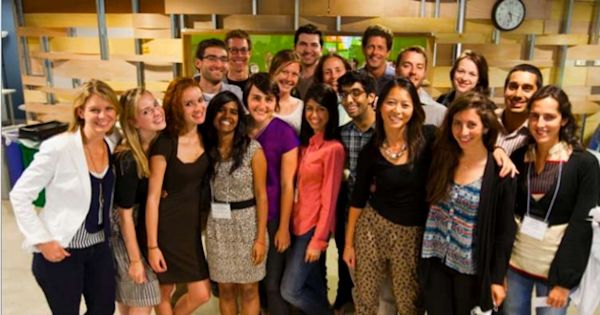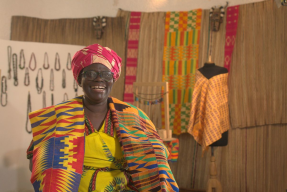Innovative Teenagers: Feeling Insignificant in Africa
October 1, 2012
I recently ran a quick survey of my fellow Fellows to find out what we were all doing at the age of 17. We generally consider ourselves a pretty ambitious, well-travelled, well-read bunch; these days, at least. Responses I got spanned the following:
‘I was sneaking into bars in Costa Rica, where I was studying abroad. Upon my return, I was plotting my next escape from my boring hometown.’
‘Slowly slowly subbing all the liquor in my parents’ cabinet for water’
‘I was at Miss Porter’s School for Girls, sneaking off in day students’ cars to smoke cigarettes and ride with the top down in a convertible.’
‘I used to sneak out of school and go to London at weekends to smoke furiously and go clubbing at the Ministry of Sound, the Fridge or alarming Nigerian places’.
‘Bartending in a bar just in front of the beach’
‘Working as a pool boy and smoking BTs in Post Park, and driving around listening to Green Day and Weezer’s début albums’
‘I was the ultimate Canadian groupie and spent half the year on exchange in the South of France, where my host mom worked doggedly to transition me from skater chick to tight trousers and high heels. I never looked back’
‘Getting my first job as a dishwasher in the UK and then a bakery (Greggs!), and discovering how attractive I find Japanese girls’
‘I’d just moved to Amsterdam to start my undergrad, and was discovering the freedoms of passing out at strangers’ apartments, drinking beer from the pitcher and knowing no boundaries. I have never looked back.’
‘Pretending to be 20 so I could date South African bartenders’.
(You may be noticing a theme here)
Special mention goes to two Ugandan Fellows who reported very wholesome activities such as Model UN, lifeguarding, touring around the nation with the High School choir, 7am student council every morning, singing in the tenor section and working at a garden centre. Impressive.
Teenagers get a pretty bad reputation. Where I’m from, teenagers all too frequently summon up images of anti-social behaviour orders, cheap cider, sulkiness and the occasional fiery riot in the middle of my capital city. Having said that, I’ve never been more impressed with anyone than by the groups of teenagers that I’ve met in South Africa. One of Kiva’s newest field partners is the African Leadership Academy (ALA), a two-year pre-university institution which seeks to transform Africa by developing a powerful network of entrepreneurial leaders. The programme focuses on leadership, entrepreneurship and African studies, and welcomes students to the Johannesburg campus from all 54 African nations. Its students have been awarded over US$21 million in scholarship funding to continue their studies at top international universities, including Ivy Leagues and Oxbridge.
ALA also connects its students to high-impact networks of people and capital to help them begin their own businesses, including ‘student businesses’ that are run alongside study. Students have already gone on to create programmes such as food security promotion in townships, literacy and self-worth programmes for at-risk youth and youth entrepreneurship projects all over Africa. Entrance is understandably highly competitive. I had the chance to meet some of ALA’s students recently, and I was overwhelmed by their ambitions and their achievements, particularly in the face of disadvantaged backgrounds: ALA is able to offer full scholarships to 85% of their students. Kiva’s role involves laptop loans to students, at a cost of $500 per laptop.
I was also able to recently attend The Anzisha Prize Awards, an annual event run in Johannesburg by ALA and the Mastercard Foundation. The Awards aim to recognise and celebrate young entrepreneurs from across the African continent; the average age of this year’s finalists, called Anzisha Fellows, was around 18. Between them, they had launched enterprises ranging from agriculture and consumer products to energy and technology initiatives.
One of my favourites was a young lady from Francistown, Botswana, who had designed her own alcohol-free and organic scent; another 17-year-old from Uganda was an entirely self-taught documentary producer. The $30,000 prize went to Andrew Mupuya, the 20-year-old founder of Youth Entrepreneurial Link Investments. Andrew began producing paper bags in an environmentally friendly fashion while still in high school in Kampala, Uganda, selling used plastic bottles to raise his seed capital. Andrew employs 13 people and his customer base includes hospitals, retail shops, supermarkets and major local manufacturers. Needless to say, the 17-year-old me pales in comparison. 270 young people in 23 countries were evaluated for the award, and about a third were women. All were under the age of 22. I’ve never been more inspired than by these groups of young people, and I’ll admit I felt slightly intimidated when comparing these kids to my own teenage self. If you’re 17 and you haven’t started a business, let alone an environmentally-friendly one, don’t worry. My fellow Kiva Fellows are a pretty impressive bunch, and a lot of them appear to have used their teenage years, mostly, to play beer pong/go shopping/chase girls/etc. At 17, my role model was more or less Elle from Legally Blonde. Things change.
Olivia Hanrahan-Soar is a Fellow in KF18, serving in Johannesburg, South Africa. She feels that there aren’t enough giraffes in Johannesburg. Check out Kiva’s education loans here, or apply to be a Kiva Fellow!
PREVIOUS ARTICLE
Week in Review: Economic Empowerment through Education →NEXT ARTICLE
Kiva Innovations: Agricultural co-ops make their mark in rural Kenya →


















